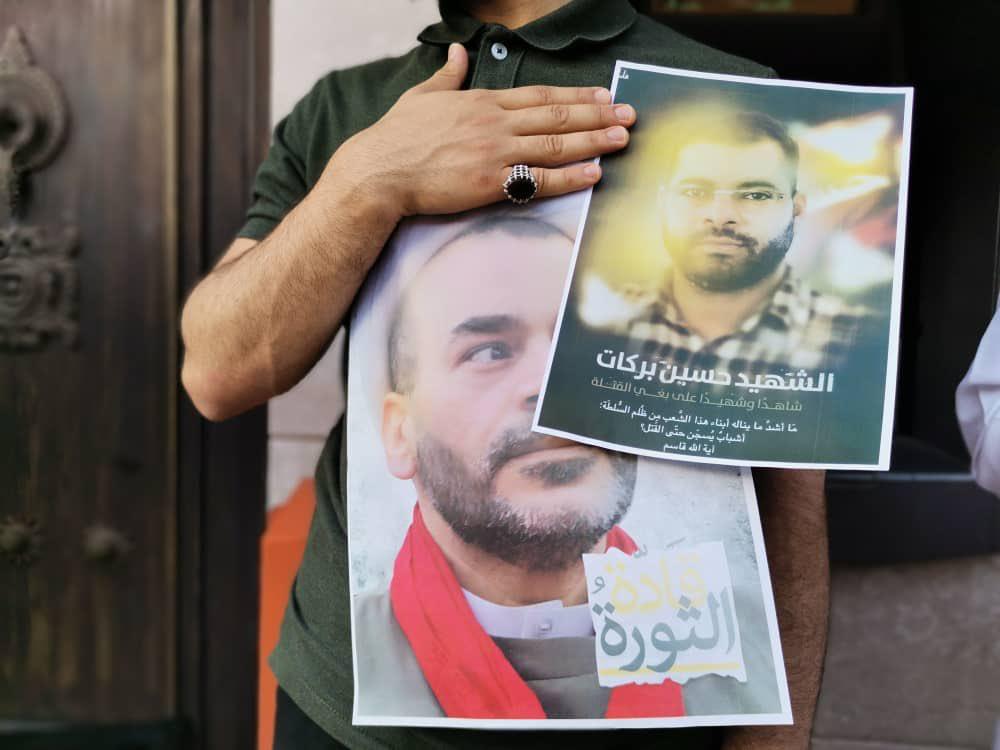Yesterday, June 9, 2021, marked the death of Bahraini prisoner of conscience, Hussein Ahmed Eissa Barakat, aged 48, due to COVID-19 complications after contracting the virus on May 27, 2021. According to an audio clip of his wife, which was widely shared on social media, she had received calls from her husband asking her to mobilize on his behalf to get help, for he was barely able to stand on his feet and that his death was imminent. In the clip, his wife demanded the Bahraini authorities allow her to see him, if only for an instance and a single glance. On June 9, SALAM DHR received a call from Barakat’s wife in which she informed them that she received a call from Salmaniya Medical Hospital notifying her of her husband’s death. It is worth noting that Hussein Barakat received two dosages of the COVID-19 vaccine. His fellow inmates, jailed with him in the same building, had failed in their attempts to take him to the hospital; the prison administration thought it sufficient to take Barakat only to the prison clinic, after which he was diagnosed with having severely low oxygen. Despite the diagnosis, Barakat was returned to his cell where he remained for 5 days before his condition rapidly deteriorated, and he was transferred from Jau Central Prison to the ICU at Salmaniya Medical Hospital. He passed away there yesterday.
Hussein Barakat was a torture victim who was previously sentenced to life imprisonment on May 18, 2018, in the trial of 138 defendants, known as ‘Zulfiqar Brigades’, who were tried under the internationally condemned anti-terrorism law. The trial did not meet the set international standards for fair trials. The victim’s son, Ali Hussein Barakat, is also facing a 22-year prison sentence due to the political crisis in Bahrain.
Hussein Barakat is a victim of the absence of accountability and the culture of impunity in Bahrain. The state bears the responsibility, as it tries innocent defendants in courts that do not meet the conditions set for fair trials and within internationally condemned legal frameworks. Further, judges rely on confessions extracted under torture as evidence of indictment. Barakat is yet another victim of the Bahraini authorities’ failure to respond to recommendations to better prison conditions to protect the prisoners from the threat of the COVID-19 pandemic. It is important to highlight the Ministry of Interior has only acknowledged a total of 3 infected cases in Jau Central Prison, whilst SALAM DHR has reported a total number of 140 cases in only Building 10 at Jau Central Prison. In his meeting with two Bahraini parliamentarians on 22 April 2021, the Minister of Interior had also denied any convicted cases. Furthermore, the Ministry of Interior carried out a public relations campaign where it took several ambassadors of other countries, including the French and British ambassadors, to visit certain facilities in Jau Central Prison and to show how well they are run and how proper healthcare guidelines and precautions against COVID-19 are adhered to, with good medical care being provided for the prisoners. However, the ambassadors were not taken to Building 12, for example, from which daily complaints and audio recordings of the prisoners asking for help against human rights violations at all levels are received. The government refuses to respond to international appeals and demands to release the detainees to protect them from the virus.
SALAM DHR has previously called on the government of Bahrain to implement the recommendations of the World Health Organization and the High Commissioner of Human Rights, which call for the release of all prisoners at great risk of COVID-19. The latest statement, signed by three Bahraini human rights organizations – Bahrain Forum for Human Rights, Gulf Institute for Democracy and Human Rights, and SALAM DHR – stressed the need for the Bahraini authorities to respond to the call of the High Commissioner of Human Rights to conduct and impartial and independent investigation into the death of the victim of torture and medical negligence, Abbas Mal Allah. The statement also stressed that the UN Special Rapporteur on Torture and Other Cruel, Inhuman or Degrading Treatment or Punishment and the UN Special Rapporteur on the right to physical and mental health are the independent experts capable of undertaking and conducting an independent and impartial investigation. As such, we support the admittance of international commissions of independent inquiry for such investigations.
Additionally, the government of Bahrain released a number of prisoners in March 2020, but did not release prisoners of conscience and politicians, including those most vulnerable to the virus, such as the elderly with the chronic illnesses, such as Hassan Musheima’, Abdulwahab Hussein, Abduljalil Al-Sunaikis, human rights defender Abdulhadi Al-Khawaja, and religious cleric Sheikh Abduljalil Al-Meqdad.
In this regard, SALAM DHR Chairman Jawad Fairooz commented, “A prisoner of conscience is infected with COVID-19 and is not released despite his deteriorating health, and today he perishes! Another funeral procession makes its way out of the prison because of medical negligence and the government bears all responsibility for the deaths of prisoners due to its failure in releasing prisoners of conscience, and, more specifically, its failure to release those infected with COVID-19, as well as its failure to hold officials in the Ministry of Interior accountable for their negligence.”
Once again, SALAM DHR urgers the government of Bahrain to take all health measures and precautions necessary to prevent any imminent danger to the prisoners, and to start releasing prisoners at a quicker rate. Further, an investigation into the Ministry of Interior’s failure to acknowledge that anyone has contracted COVID-19 should be made, with all officials in the ministry who had misled the local and international community and had worked to discredit families of prisoners and human rights organizations over news of prisoners’ infected cases be held accountable. Though the truth was revealed to the public yesterday, it was too late.


 العربية
العربية Français
Français Deutsch
Deutsch